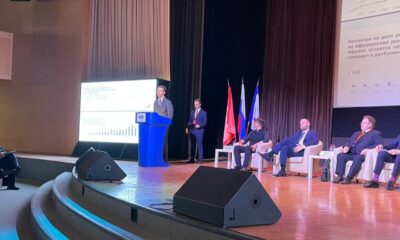National Issues
Herdsmen And Farmers Incessant Clashes: The Source And Its Healing Balm


Paul E. Michael
Few months back, precisely April 25, 2016, when over 500 Fulani herdsmen invaded Nimbo community in Uzo-Uwani Council Area, Enugu State and callously killed about 48 community dwellers, the mainstream and social media was saturated with several public opinions in condemnation of the gruesome attack.
There were calls from opinion leaders, religious leaders, politicians, human rights activists, traditional rulers as well as Nigerians across the nation, asking President Mohammadu Buhari and Security Agents, to profer a lasting solution to such unlawful attacks before it becomes a tradition in our nation.
While Nigerians wait patiently for the delayed response of President Buhari and his security team, the attacks on farmers and community dwellers, which is being perpetrated by suspected herdsmen, has sadly outgrown the boko haram terrorist activities on the Northeastern part of the country. Properties worth billions of Naira have been destroyed, thousands of Nigerians have been killed and multitude of our people have been rendered homeless and displaced. This imbroglio has become a major concern to citizens of our nation as well as the international community.
The unabated killing of Nigerians as well as the unwarranted destruction of properties – crops, farm produce, cattles, farm houses and residential apartments – needs to be discouraged as prompt as possible. Otherwise, it will lead to unresolve war, which will certainly undermine the fragile unity that exist between the North and South. This, we cannot accept as patriotic citizens.
According to Al-Jazeera on July 17, 2016, “within a week, over 80 people have been killed in Nigeria by herdsmen”. Logo and Ukum council areas in Benue State, are the affected Local Government Areas. As if that is not enough, a top ranking traditional ruler (Saf Ron Kulere), Sir Lazarus Agai, was reportedly murdered by suspected herdsmen in his home village, Sha in Plateau State, on Monday 18th July, 2016, while returning from his farm.
As we mourn the deceased and console their families, we must not forget to establish lasting solution(s) and also admonish the government on the need to effect such speedingly. Continuous complaints and criticism without potential solutions, will not abate the alarming situation we found ourselves. The callous killing of fellow Nigerians and the unwarranted destruction of properties must be stopped and now.
The Federal Government should stop being reluctant in putting a one time stop to this age-long conflict. Of course, the conflict is not the making of the President Buhari’s administration but we cannot deny the fact that the attacks have gained higher momentum since the inception of this administration. Perhaps, this is connected to the wide ethnic lines that exist across the nation.
However, a government that is determine to protect the lives and properties of its citizens will look beyond ethnic divide and design systems and policies that encourage peaceful coexistence. The attitude of being mute on issues that involve the lives of Nigerians, is a stigma on the part of the President that Nigerians should not tolerate.
Honestly, the killing of Nigerians as well as cattles and the destruction of crops and farm produces are detrimental to the progress of our nation. Our economy has being feeling the impact of the global fall in oil price, the fall in the value of the Naira as well as the sabotage being perpetrated by the so called Niger Delta Avengers.
Unfortunately, the agricultural sector, which is the most viable alternative for diversification of our oil centered economy, is now being jeopardized for no just course, thereby adding to the woes of the economy. Certainly, we cannot continue this way, as there is now widespread of fear across the polity. It is therefore expedient, that we trace the roots of this menace if we are ready to make any headway.
From my personal findings, the herdsmen and farmers menace is an age-long conflict that was triggered by disagreement between both parties.
At the Northern part of the nation, male offspring as young as 12 years old can be given a bull and cow by his parents as his inheritance and such a young boy is left with the burden of becoming a man by successfully rearing the inherited animals.
In another vein, a wealthy farmer can employ a pastoral Fulani to graze and manage his herd in the bush. This system of husbandry allows the herdsman to lead and protect the herd from harm in the bush, as they source for free grazing land with leguminous plants. This is why herdsmen go about with light arms, charms and other protective equipments that make them dangerous to the environment.
This practice is a norm in all Fulanis society, thus the success of the system in the core North, where the Fulani people are mainly occupying. As the number of cattles increased and construction activities continue due to civilisation and development, there were insufficient grazing fields and leguminous plants. Hence, the wandering of herdsmen and their herds toward the southern part of the nation becomes unavoidable.
The middle-belt region and its environs became alternative location for grazing activities. States like Benue, Plateau, Taraba, Kogi, Enugu, etc, whose occupation is mainly farming, became host States for grazing cattles. Farmlands were subsequently taken over by the herdsmen and their herds, leading to the destruction of crops and farm produce.
In some States, community leaders contributed immensely to the conflict, as they sold farmlands to herdsmen without the approval of community dwellers.
As the farmers continued loosing their crops and produce, anger and frustration mounted up, so they reacted by attacking the herds of the herdsmen and began to chase them out of their communities. The unabated lose of cattles and denial of grazing fields eventually made herdmen frustrated, so they regrouped and began a coordinated attack on communities and farmers, which has now degenerated into serial attacks and currently a nightmare in many States of the federation.
It is quite unfortunate that cattle became highly valued to human life. This unimaginable circumstance, is the fate of our nation today, but there is still hope for a new beginning.
This hope is hidden in our ability to sacrifice. We must be ready to loose today, so that we can profit tomorrow. The simple solution has been prescribed by different public players. It has to do with restriction of contact between farmers’ crops/farm produce and herdsmen’s cattles.
Yes, the reserved grazing routes being proposed by the government and the Miyetti Allah Cattle Breeders Association of Nigeria, is a good initiative; it will encourage free grazing and promote good output. However, restriction of contacts with farmers’ produce, which is the source of this alarming conflict, cannot be guaranteed.
Therefore, Ranches should be created in all or some selected States. If we cannot deny the importance of livestock farming in the agenda towards food security, all States must be ready to make this sacrifice. When created, such Ranches will generate different employment opportunities, make our society more organised and most importantly, put a one time stop to the incessant attacks between herdsmen and farmers.
The herdsmen under the Miyetti Allah Cattle Breeders Association, need to accept this proposal except they want the world to believe that truly cattles are more important than Humans in our country. As for the farmers, they must be willing to let go some of their farmlands for the purpose of Ranches except they are comfortable with the wanton destruction of lives and farm produce.
This is a permanent solution; the authentic healing balm that is void of ethnic sentiment, so it should not be taken lightly.
Paul Michael, a Criminoligist and a Civil Activist, writes from Benin City and can be reached through paulebi4eva@gmail.com

















